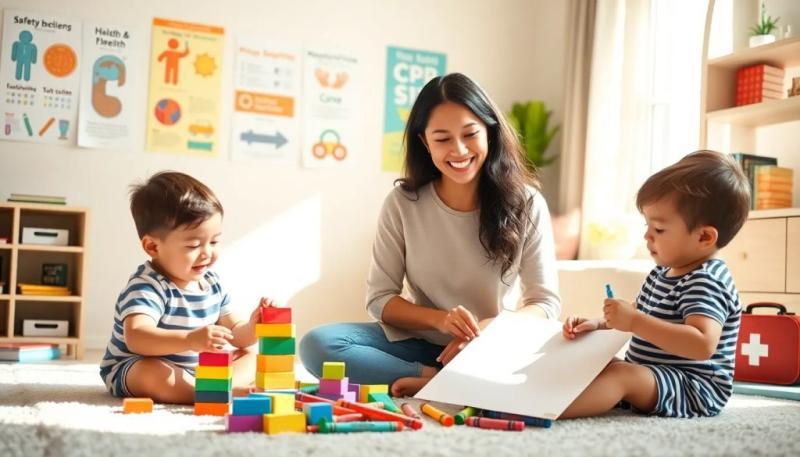When considering the responsibilities of a babysitter, a crucial question arises: Do babysitters need CPR in the US? While not legally mandated, obtaining CPR certification is highly recommended for anyone caring for children. This article explores the importance of CPR training, its benefits, and how to obtain certification.
Understanding the role of a babysitter goes beyond just supervising children. It involves being prepared for emergencies and knowing how to respond effectively. This preparation often includes CPR and First Aid training, which can make a significant difference in critical situations.
CPR certification requirements for babysitters
In the US, there are no federal laws that specifically require babysitters to hold CPR certification. However, many organizations advocate for it as a best practice. States like Maryland have specific requirements regarding CPR certification for babysitters. It's essential for potential babysitters to familiarize themselves with local regulations.
Many parents prefer hiring babysitters who possess CPR certification. This preference stems from the peace of mind knowing that their children's caregiver is prepared for emergencies. Hence, while not required, having certification greatly enhances a babysitter's employability.
- Federal regulations do not mandate CPR certification.
- State guidelines, like those in Maryland, may have specific requirements.
- Employers often prefer CPR-certified babysitters.
- Certification can lead to higher pay rates for babysitters.
Does my child need to be CPR certified to babysit?
Many parents wonder if their children, who wish to babysit, need to be CPR certified. While it is not strictly necessary, obtaining certification can provide valuable skills and knowledge. Parents should consider the age and maturity of their child when making this decision.
CPR training can equip young babysitters with the ability to respond effectively in emergencies. Organizations like the American Red Cross offer babysitting courses for children as young as 11, ensuring they have the essential skills needed for safe child care.
In addition to CPR, these courses often cover topics like child behavior management and emergency preparedness, making them comprehensive training options for aspiring babysitters.
What are the benefits of CPR certification for babysitters?
One of the primary benefits of CPR certification for babysitters is the increased confidence it instills. Knowing how to react in an emergency situation can help babysitters feel more secure in their roles. This confidence can translate into better supervision and care for children.
Another significant advantage is the ability to respond to a variety of emergencies, from choking to injuries. With proper training, babysitters can provide immediate assistance until professional help arrives. This skill is invaluable, especially in high-stress situations involving children.
- Enhanced ability to handle emergencies effectively.
- Increased employability and trust from parents.
- Confidence in providing care and supervision.
- Comprehensive understanding of child safety.
What is CPR certification for babysitting?
CPR certification for babysitting typically encompasses training in cardiopulmonary resuscitation (CPR), automated external defibrillator (AED) use, and basic first aid. These skills are essential for anyone caring for children, as they prepare caregivers to manage emergencies effectively.
Certification programs often focus on age-specific techniques, such as CPR for infants and children, ensuring that babysitters are equipped to handle situations relevant to their charges. The training includes practical components, allowing participants to practice their skills in realistic scenarios.
Organizations such as the American Red Cross and Safe Sitter® offer structured courses that provide certifications upon completion. These courses are designed to ensure that babysitters are well-prepared for their responsibilities.
How to find CPR certification courses near you
Finding CPR certification courses for babysitters has become easier with numerous organizations offering training. The American Red Cross, for example, provides both in-person and online courses, catering to various preferences and schedules.
In addition to traditional courses, many platforms now offer online training, allowing babysitters to learn at their own pace. This flexibility can be particularly beneficial for young babysitters balancing school and other commitments.
- Visit the American Red Cross website for course offerings.
- Check local community centers or hospitals for available classes.
- Explore online platforms that provide CPR training.
- Contact local childcare organizations for recommendations.
What age should you get CPR certified for babysitting?
The ideal age for obtaining CPR certification varies, but many organizations recommend starting at around 11 years old. At this age, children are typically mature enough to understand the responsibilities involved in babysitting and can grasp the concepts taught in CPR courses.
Parents should assess their child's readiness based on maturity and interest in babysitting. Enrolling them in CPR training can be an excellent way to prepare them for future babysitting opportunities while ensuring they have the necessary skills to care for younger siblings or family members.
Additionally, many courses are tailored specifically for youth, making the learning experience engaging and age-appropriate. This can help foster a sense of responsibility and confidence in young babysitters.
Questions related to babysitting and CPR certification
Do I have to be CPR certified to be a babysitter?
No, you do not have to be CPR certified to be a babysitter in the US. However, it is highly recommended as it enhances your ability to manage emergencies effectively. Parents often prefer hiring babysitters with CPR certification, as it demonstrates a commitment to safety and preparedness.
Being CPR certified can also make babysitters more competitive in the job market. It indicates to parents that you are serious about your responsibilities and have taken the initiative to equip yourself with essential lifesaving skills.
Should babysitters know CPR?
Yes, babysitters should know CPR. Having this knowledge can significantly impact a child's safety during emergencies. CPR training equips babysitters with the skills to respond to situations such as choking, drowning, or cardiac arrest.
Furthermore, CPR training provides a sense of confidence in dealing with emergencies. This confidence can translate into better decision-making and a calmer demeanor in high-pressure situations, which is crucial when caring for children.
What certifications do I need to babysit?
While there are no specific certification requirements to babysit, obtaining CPR and First Aid certification is highly advisable. Many organizations offer babysitting certifications that include these important elements, enhancing your qualifications.
In addition to CPR, other certifications that can be beneficial include child care training, basic first aid, and even courses that cover child development. These credentials can make you a more attractive candidate for babysitting jobs.
Do you have to be certified to be a sitter?
No, certification is not a legal requirement to be a sitter. However, being certified in CPR and First Aid can greatly enhance your skills and credibility. Many parents look for babysitters who have taken the initiative to complete relevant training.
Ultimately, while it's not mandatory, obtaining certifications can provide peace of mind for both the babysitter and the parents. It shows a commitment to safety and professional development in child care.
Para ampliar este tema, te presentamos un video que explora la necesidad de que las niñeras tengan formación en RCP en Estados Unidos.





